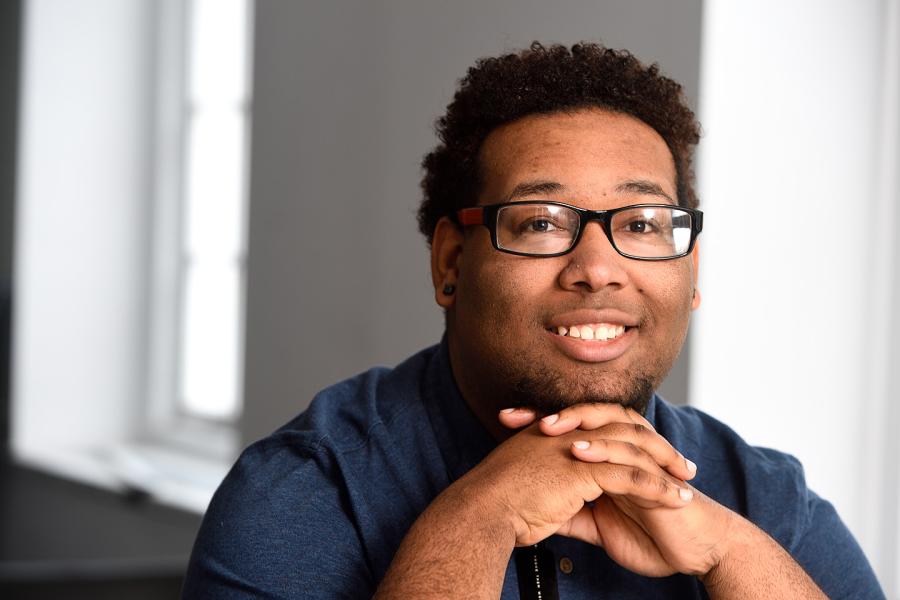Plenty of people struggle to listen to others. Not so with Malik Johnson. A senior academic program coordinator at Johns Hopkins University's Whiting School of Engineering, Johnson has perfected the art of absorbing what students tell him—and in asking just the right follow-up questions to inspire insight and action.
"People's stories and situations are fascinating," Johnson says. "I've always liked listening, and that's probably why I ended up working in student advising."
Yet Johnson's own path to higher education wasn't without obstacles. A first-generation college student in his family, Johnson found himself flailing as an undergraduate at Hood College—a story he talks openly about and shared this past fall in a TEDx Talk at his alma mater. "My first semester GPA was a 0.9," he says. "I fell flat on my face."
Johnson says he reached out to professors for advice and "would get blank stares." At the same time, his family's words reverberated in his head: Don't mess up. Don't mess up. "Everyone was telling me what not to do, but no one told me what I actually needed to do," he says about his college experience. "I didn't know where to turn."
Johnson cycled through majors, changing from psychology to business and human resources. He worked full time to make ends meet, weathering a grueling schedule that left him dozing in classes. Desperate for advice, he turned to his mother, calling her from campus one bright, sunny day and begging her to simply listen. But his mom's response—the classic I told you so—felt like a jolt of negativity and only rattled him more.
Through the experience, Johnson was put on academic probation and developed imposter syndrome, a topic he wrote about in an article published last year in Times Higher Education. "In the back of my head, I was always asking: Can I really do this? Just because I can, should I do this?" he says.
Johnson says he continually reminded himself of his accolades: He had graduated in the top 5% of his Baltimore high school and applied to—and been accepted by—13 colleges across the country, including selective universities. "I chose Hood for its welcoming environment," he says. "They had recruited me and told me they wanted me there, so I was determined to find a way."
Eventually, Johnson took a position in Student Engagement at Hood that helped him see his potential and stay on track. "Gretchen Nonemaker in that office became my mentor and taught me so much," Johnson says. "Through her mentorship and my role there, I learned how to put students at ease and talk to them in encouraging ways." He also gained leadership skills, working as both an orientation assistant and as the coordinator of recreational activities across campus, "supporting incoming students as they transitioned to campus and making sure all students had fun stuff to do during their time there," he says.
His perseverance paid off, allowing him to graduate from Hood in 2019 and go on to work as a consultant for nonprofit organizations. From there, he took a position as an admin secretary at Johns Hopkins' Krieger School of Arts and Sciences. "I worked at the front desk and loved watching interactions between students and advisers," Johnson says. "Students would come in frazzled at times, and I discovered that I had a calming presence and could help defuse tough situations."
Determined to stay in higher education, Johnson moved to a position that involved coordinating faculty events at the Johns Hopkins Carey Business School. Meanwhile, he pursued a master's degree in higher education policy, research, and administration at Goucher College, graduating in 2021—and becoming the first in his family to hold not just a bachelor's degree but also an advanced degree.
Now, as a senior academic program coordinator in the Whiting School, Johnson uses his experience to help the cohort of students—including many first-generation college students—he guides and coaches through the demands of various engineering degrees. "I ask probing questions and tell them not to be afraid to say, I need help," he says.
In addition, Johnson prods students to actively create their own support networks—say, by building relationships with department heads and professors—rather than relying on family to help them navigate an unfamiliar process. They can "seek out and find solace in friends who understand what they're going through," he advises, and learn to recognize the telltale signs of imposter syndrome, which Johnson believes is bound to show up for not just first-gen students but also others.
"Even to this day, I experience imposter syndrome and tend to downplay my accomplishments, believing they're more a matter of luck than something I've worked toward and deserve," Johnson says. But recognizing the human tendency to think this way is a first step, opening the door to healthier thought processes—and to "reminding myself that I did in fact work hard and earn my achievements," he says. "They weren't handed to me on a platter."
Johnson urges students to stop and critically assess situations before jumping to conclusions. "College students are inclined to see problems through the lens of their own self-interests, without realizing the bigger picture," he says. "I help them understand that not everything is about them personally. There are larger systems and interactions at play."
When it comes to preparing students for the job market, he wants them to realize the value of hands-on research and work experience. "I don't want them to just rely on the Hopkins name to land a job," he says. "Today, more people enter the engineering job market with strong internship experience and even advanced degrees. Students need to plan accordingly."
Although Johnson's background didn't make college easy, he considers the insight he gained from it key to advising students in similar situations. "For this reason alone, I wouldn't trade my background and experience for anyone else's," he says.
Additionally, his perspective is vital to helping the university broaden its outreach and support for diverse students, the topic of another article he wrote, "Because You're Worth It: How Universities Can Prove Their Value to Prospective Students," for Times Higher Education. Among his recommendations are for colleges to promote and raise awareness not just about basic supports like tutoring and writing assistance but also tailored offerings, such as Johns Hopkins' mentoring program for first-gen and limited-income students, available through the FLI Network. "Students need to know about and take advantage of these incredible support systems, and universities need to keep offering and expanding them to give these kids what they need," Johnson says.
Posted in News+Info
Tagged who does that?









